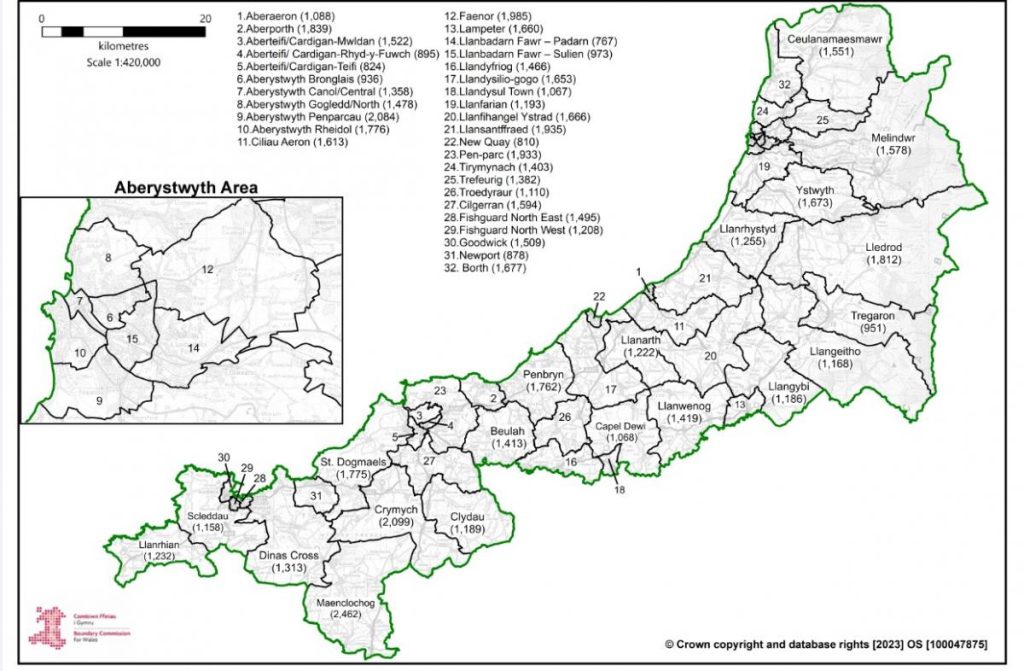Politics
Candidates fighting for the Ceredigion Preseli seat have their say

CEREDIGION Preseli general election hopefuls have outlined why you should vote for them on July 4.
As part of constituency changes, bits of north Pembrokeshire – including St Davids and– are joining the new Mid and South Pembrokeshire constituency.
Other parts of the north of the county are now in the new Ceredigion Preseli constituency; which extends up past Aberystwyth and also includes Cilgerran, Crymych, St Dogmaels, Fishguard and Llanrhian.
There’s now a 15-candidate battle for the two seats, eight in Mid and South Pembrokeshire and seven in Ceredigion Preseli.
With a July 4 date set for the general election, candidates for the new Ceredigion Preseli seat are: Ben Lake for Plaid Cymru, Liberal Democrat Mark Williams, Welsh Labour’s Jackie Jones, Conservative Aled Thomas, Tomos Barlow for the Green Party, Karl Robert Pollard for Reform UK, and Taghrid Al-Mawed for the Workers Party of Britain.

Plaid Cymru candidate, Ben Lake, elected as MP for the Ceredigion constituency in 2017, said: “As someone deeply rooted in this constituency, I understand the unique challenges that our rural communities face. We are fortunate to live in such a remarkable place, but our needs are often forgotten and ignored.
“The last seven years have been challenging for several reasons but during these difficult times I have stood up for my constituents both at Westminster and locally, helping over 5,000 constituents with casework since 2020 and raising their concerns in Parliament on over 1,000 occasions.
“Having a strong, local voice is essential to hold any government to account and to demand a fairer, more prosperous society for our rural communities.”

Liberal Democrat candidate Mark Williams, a former MP for Ceredigion, said: “I started my working life working for Geraint Howells formerly MP for Ceredigion and Pembroke North.
“Unashamedly, I am seeking to be a constituency-focused MP always putting the interest of local people first. My family and I live here, we use local services, and I know the issues that matter to local people.
“As a Liberal Democrat I am committed to campaign for fairer funding for our Senedd to support our critical public services, a fairer deal for carers and support for our family farms. As a teacher in a village school, I see day in day out the lack of funding for our schools. Being an MP is not an easy job, I have done it before, and with your support hope to again.”
Green Party candidate and Aberystwyth student Tomos Barlow said: “Electors should know that there is a crisis in this constituency. As we’re seeing a dying planet, public services crumbling, a lack of jobs and job insecurity rampant in our area, we need a party who can bring those innovative ideas that can tackle these issues at the core.
“With the other parties promising more of the same, a vote for me and the Green Party is a vote for a better future with true hope and true change, as well as a young persons’ perspective on the issues that we are facing as a constituency.”
Workers Party of Britain candidate Taghrid Al-Mawed said: “Firstly because I am one of them, I am a housewife who wants to work for the people of the constituency and not a party.
“The people here need change, away from the establishment parties that are doing nothing for the area. I can see it, I can feel it. I am part of a party that puts the people first, not the party’s needs. I want to represent the people and not be part of a single-party dominated constituency that has an AM, an MP and a county council all run by one party that does nothing but protect itself and puts the party first people second.”
All candidates were contacted and asked why they should gain your vote. Jackie Jones, Aled Thomas and Karl Robert Pollard did not respond to requests for comment.
The candidates have also been contacted for further responses on subjects to come; the next two being the cost-of-living crisis/the economy and agriculture/the countryside.
News
Kurtz calls on Labour MPs to back release of Mandelson papers

Opposition motion follows Epstein-linked document disclosures
A SENEDD Member has called on Labour MPs to support a Conservative Opposition Day Motion demanding the release of papers linked to Peter Mandelson’s appointment as the UK Ambassador to the United States.
Samuel Kurtz said the motion follows the publication of new files and photographs involving Lord Mandelson, which were released as part of a United States investigation into the disgraced and convicted child sex offender Jeffrey Epstein.
Speaking out, Mr Kurtz said that during Prime Minister’s Questions, the Prime Minister admitted he was aware of Peter Mandelson’s ongoing relationship with Epstein at the time of his appointment.
“That means the Prime Minister knowingly appointed Peter Mandelson to one of the most important diplomatic roles in government despite his links to Epstein,” he said. “This raises serious questions about the Prime Minister’s judgement.”
Mr Kurtz went on to accuse the Prime Minister of attempting to prevent transparency over the appointment process.
“Now, instead of being open and transparent, the Prime Minister is attempting to block the release of documents relating to Mandelson’s appointment in order to protect his own position,” he said.
He warned that Labour MPs who oppose the motion would share responsibility for withholding information, adding: “If Labour MPs support blocking the release of these papers, they will be complicit in covering up the process and judgement that led the Prime Minister to appoint Peter Mandelson as Ambassador, despite his friendship with Jeffrey Epstein.”
News
Welsh peace campaigner removed from court during Palestine protest case

Concerns raised over use of terrorism laws against silent sign-holders as Welsh activist among those ejected from London hearings
A WELSH peace campaigner was among several protesters removed from court by security staff this week as plea hearings continued for people charged under terrorism legislation for holding pro-Palestine signs.
Angie Zelter, aged 74, from Knucklas, appeared at Westminster Magistrates’ Court in London on Monday as part of mass proceedings linked to the Government’s ban on Palestine Action.
Campaigners say hundreds of people across the UK – including some in Wales – have been charged under Section 13 of the Terrorism Act 2000 after quietly holding handwritten signs reading: “I oppose genocide. I support Palestine Action.”

Zelter, a long-time anti-war activist and founder of Trident Ploughshares, attempted to read a prepared statement criticising the prosecutions before being escorted from the courtroom, according to supporters.
She told the court she did not accept being labelled a terrorist for what she described as peaceful protest and opposition to the war in Gaza.
Outside the building, fellow campaigners said she had sought to argue that international law and freedom of expression should protect non-violent dissent.
Also removed from the hearing was Tim Crosland, co-founder of Defend Our Juries, who said he had tried to raise legal objections to the charges before being asked to leave.
Arrests nationwide
Organisers of the “Lift The Ban” campaign claim nearly 3,000 people have been arrested across Britain since late 2025 for taking part in silent vigils, with several hundred now facing prosecution. The offences carry a maximum sentence of six months in prison.
The group argues the legislation is being used to criminalise peaceful protest. It is calling on the Government to lift the ban on Palestine Action and to change its stance on military cooperation with Israel.
However, ministers have defended the proscription, saying the organisation has been linked to criminal damage and disruption at sites connected to defence manufacturing.
Welsh perspective
While most hearings are taking place in London, campaigners say demonstrators in Wales have also taken part in sign-holding protests.
Civil liberties advocates have warned that applying terrorism laws to non-violent protest risks setting a troubling precedent.
For many in mid Wales, the sight of a pensioner from rural Powys being removed from a courtroom has sharpened debate over where the line lies between legitimate protest and criminality.
Further hearings are scheduled in the coming weeks, with more defendants from across the UK expected to appear.
Business
Bid to convert office space into chocolate factory, salon and laundrette

A CALL for the retrospective conversion of office space previously connected to a Pembrokeshire car hire business to a chocolate factory, a beauty salon and a laundrette has been submitted to county planners
In an application to Pembrokeshire County Council, Mr M Williams, through agent Preseli Planning Ltd, sought retrospective permission for the subdivision of an office on land off Scotchwell Cottage, Cartlett, Haverfordwest into three units forming a chocolate manufacturing, a beauty salon, and a launderette, along with associated works.
A supporting statement said planning history at the site saw a 2018 application for the refurbishment of an existing office building and a change of use from oil depot offices to a hire car office and car/van storage yard, approved back in 2019.
For the chocolate manufacturing by ‘Pembrokeshire Chocolate company,’ as part of the latest scheme it said: “The operation comprises of manufacturing of handmade bespoke flavoured chocolate bars. Historically there was an element of counter sales but this has now ceased. The business sales comprise of online orders and the delivery of produce to local stockist. There are no counter sales from the premises.”
It said the beauty salon “offers treatments, nail services and hairdressing,” operating “on an appointment only basis, with the hairdresser element also offering a mobile service”. It said the third unit of the building functions as a commercial laundrette and ironing services known as ‘West Coast Laundry,’ which “predominantly provides services to holiday cottages, hotels and care homes”.
The statement added: “Beyond the unchanged access the site has parking provision for at least 12 vehicles and a turning area. The building now forms three units which employ two persons per unit. The 12 parking spaces, therefore, provide sufficient provision for staff.
“In terms of visiting members of the public the beauty salon operates on an appointment only basis and based on its small scale can only accommodate two customers at any one time. Therefore, ample parking provision exists to visitors.
“With regard to the chocolate manufacturing and commercial laundrette service these enterprises do not attract visitors but do attract the dropping off laundry and delivery of associated inputs. Drop off and collections associated with the laundry services tend to fall in line with holiday accommodation changeover days, for example Tuesday drop off and collections on the Thursday.
“With regard to the chocolate manufacturing ingredients are delivered by couriers and movements associated with this is also estimated at 10 vehicular movements per week.”
The application will be considered by county planners at a later date.
-

 Health6 days ago
Health6 days agoConsultation reveals lack of public trust in health board
-

 Community7 days ago
Community7 days agoPembrokeshire students speak at national Holocaust Memorial Day event
-

 News1 day ago
News1 day agoPrincess of Wales visits historic Pembrokeshire woollen mill
-

 Crime5 days ago
Crime5 days agoPembroke man accused of child sex offences sent to Swansea Crown Court
-

 Community6 days ago
Community6 days agoCampaign to ‘save’ River Cleddau hits over 2,200 signatures
-

 Education7 days ago
Education7 days agoAttendance concerns at Milford School reflect wider issue raised at the Senedd
-

 Health3 days ago
Health3 days agoDoctor struck off after sexual misconduct findings at Withybush Hospital
-

 Crime7 days ago
Crime7 days agoFormer soldier jailed for stalking police officer over past arrest


























